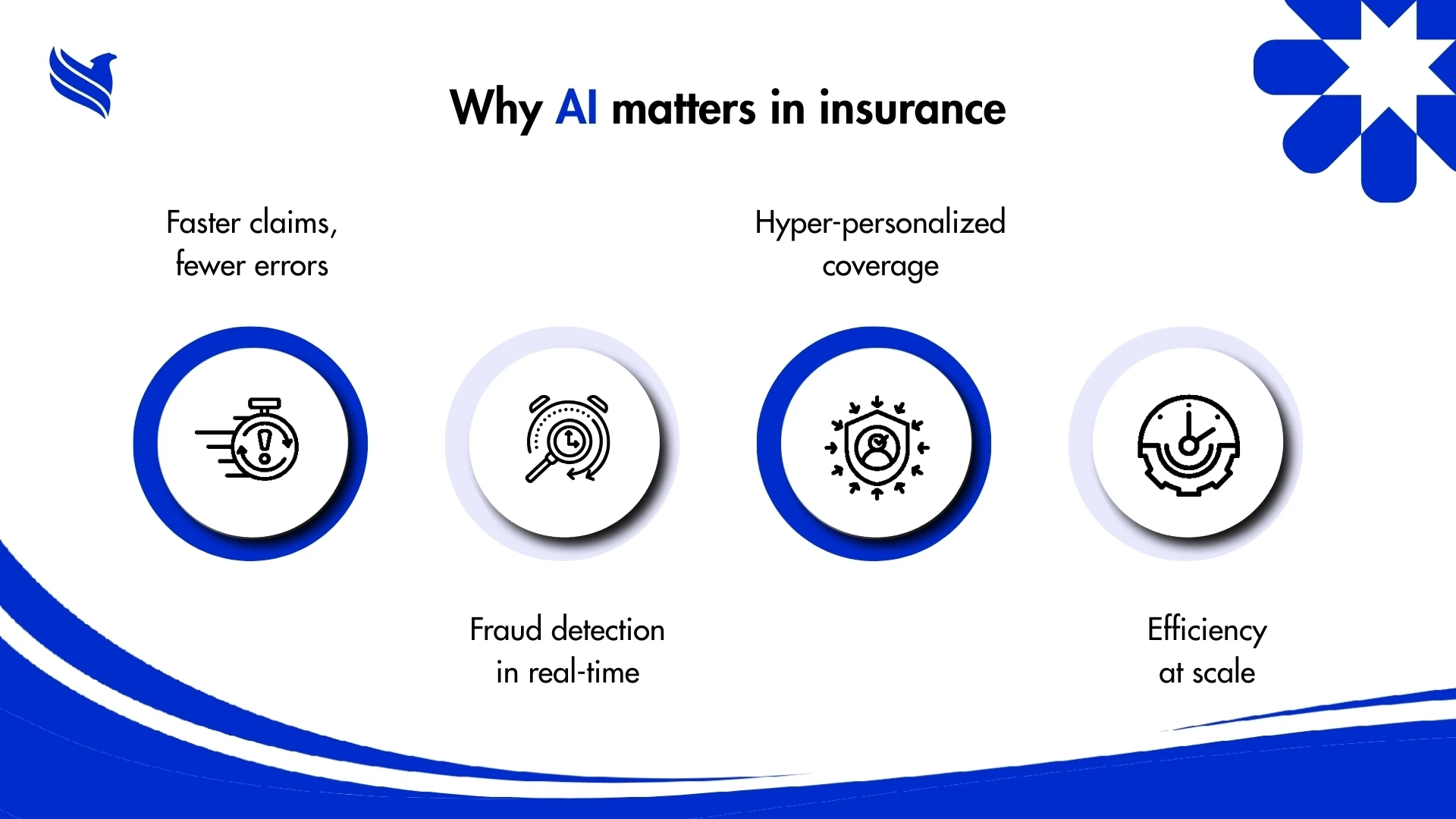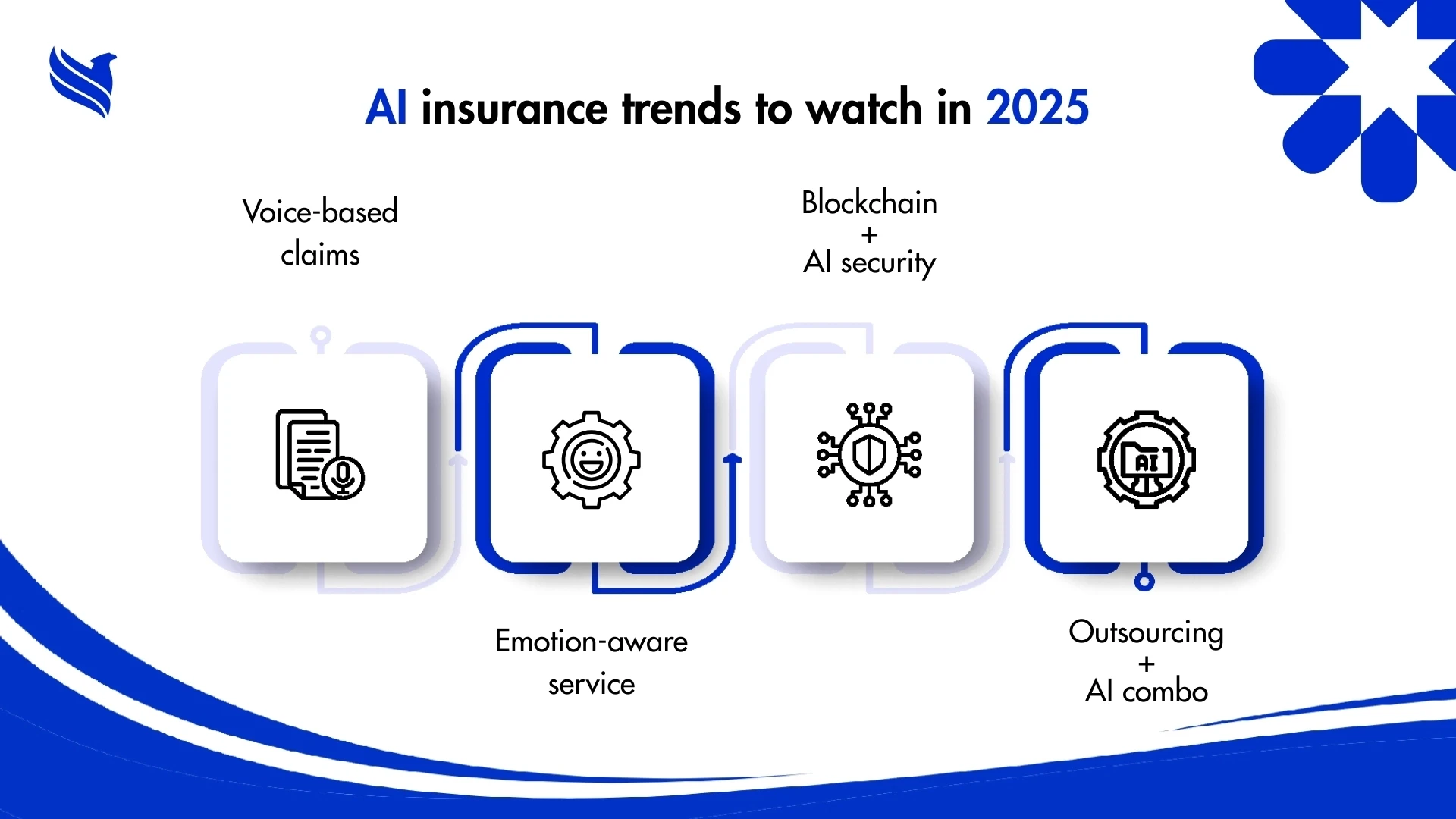Find out how AI reshapes insurance customer experience, practical insights on personalization, efficiency, and future trends every insurer should know.
The insurance world has always faced change, but the last decade has been faster and more unpredictable than most expected. Customers want clarity, speed, and personalization, in 5 seconds, if possible. Traditional insurers are often stuck juggling slow processes, policies that read like legal scrolls, aging systems, and fraud that keeps evolving. Getting service right, quick, smooth, and compliant, feels like threading a needle.
The fact is: Artificial intelligence services for insurance are stepping in. AI in insurance isn’t just a fancy tool. Chatbots can answer questions in real-time. Predictive models catch fraud before it spreads. Policies can finally fit the person, not some generic template. Tasks that once dragged on for weeks now happen in hours. And when internal teams can’t handle the load, specialists offering artificial intelligence services for insurance provide the missing muscle, expertise, speed, and scale that makes a real difference.
In this blog, the focus is on how AI is changing insurance from the ground up. Smarter intake, predictive claims handling, and hyper-personalized experiences are raising the bar for what customers expect. Insurers aren’t just keeping up; they’re being forced to rethink everything. AI in insurance has become the backbone of speed, accuracy, and customer satisfaction. Ignore it, and the gap between expectations and delivery only grows wider.
Evolution of AI in insurance
The story of AI in insurance isn’t neat. It’s layered and still unfolding. Think of it less like a sudden arrival and more like a long, uneven climb.
- Early 2000s beginnings: AI was tucked in the background. Mostly underwriting. Risk assessment. Quiet math that nobody outside the back office cared much about.
- Automation era: Then came the push to digitize, scanning endless forms, shrinking paper piles, trimming manual grunt work. Efficiency became the big word. Carriers threw money at automation because it saved hours, not because it wowed customers.
- Chatbots arrive: The real turning point? AI-powered chatbots. First-gen bots weren’t glamorous, answering “Where’s my claim?” or “What’s my policy status?” But even simple automation mattered. By 2019, most of the North American insurers had tested or deployed them.
- Today (2025): Chatbots aren’t just parrots spitting canned answers. They can learn. Predict. Carry conversations that feel natural. Customers leave less frustrated. Service feels smoother. And insurers finally see AI not just as a tool, but as part of the customer experience itself.
- The bigger shift: The evolution of AI in insurance isn’t about machines replacing humans. It’s about augmentation. Bots eat up repetitive questions; humans handle the messy, nuanced stuff. During peak claim seasons, this balance keeps the ship steady, business continuity without burning out teams.
The future? Not robots running the show. It’s humans and intelligent systems working side by side, each filling the gaps the other can’t.
Role of AI in insurance
The role of AI in insurance has expanded far beyond bots and automation. Think of it as the industry’s digital nervous system, connecting customer behavior, claims, fraud, and operational efficiency.
- Policy Personalization – AI studies lifestyle, financial health, driving patterns, and even fitness data to tailor coverage plans. Insurance shifts from generic protection to “right-fit” policy recommendations.
- Risk Prediction – Machine learning models detect hidden risk factors. For auto insurers, telematics data now feeds into predictive models, not just determining “if” a driver is risky but “when” and “how” risk may appear.
- Fraud Prevention – Fraud accounts for billions in losses annually. AI in fraud prevention pinpoints abnormal patterns during claims processing. What once needed human investigation now happens in real-time, declining false claims before payout.
- Customer Retention with AI – Predictive analytics helps insurers know when a customer might churn. Proactive engagement, whether it’s special offers or enhanced support, reduces attrition, turning retention into a science.
In plain terms, AI is making insurance proactive instead of reactive. Instead of waiting for problems, companies anticipate needs. And that’s a game-changer in trust-driven industries.
How AI improves customer experience
At the heart of the competition lies insurance customer experience, and this is where AI truly shines.
Customers don’t just want fast, they want simple, personalized, and transparent. Here’s how AI improves customer experience in insurance:
- Claims in Minutes, Not Weeks – Smart intake systems automatically extract, verify, and process claims data. Imagine a customer snapping a photo of a fender bender, uploading it through an app, and receiving an approval within hours. AI ensures accuracy while reducing delays.
- AI-Powered Chatbots – These have evolved from basic scripts to conversational assistants. They answer questions like “Is my treatment covered?” or “What’s my deductible left?” with context-specific precision, available 24/7.
- Hyper-Personalization of Policies – AI tailors premiums to usage. Health insurers reward customers who walk 8,000 steps daily. Auto insurers monitor driving patterns and adjust accordingly. The result? Customers feel their premiums reflect their lifestyle, not just a broad average.
- Frictionless Onboarding – From auto-filling forms to verifying documents instantly, new policyholders save themselves a maze of paperwork.
This evolution is not only about convenience but also trust. When customers see faster resolutions and personalized care, their loyalty deepens. That’s why insurers focusing on AI-driven CX see higher retention rates and better Net Promoter Scores.
AI insurance trends to watch

By 2025, AI isn’t hype, it’s mainstream. Still, some trends are shaping the next decade of insurance digital transformation:
- Voice-Based Claims Reporting – With AI virtual assistants gaining accuracy, customers may file claims simply by speaking to their device.
- Emotion Recognition in Customer Service – AI tools detect frustration or confusion in a customer’s voice, triggering escalation to human agents quickly.
- Blockchain Meets AI – Securing claims and transactions with blockchain, while AI determines legitimacy in real time.
- AI Plus Outsourcing – More insurers are blending outsourcing with advanced artificial intelligence services. When in-house capabilities fall short, working with global outsourcing experts has become the new efficiency model. And for many, outsourcing to a BPO partner is the smartest move to keep costs down while upgrading digital capabilities.
The trendline is clear: 2025 is not about optional experimentation but enterprise-wide AI adoption.
How is AI used in customer service for insurance
If there’s one area where AI is visibly changing insurance, it’s customer service. How is AI used in customer service for insurance? The list is steadily growing.
- Virtual Assistants – Policyholders get 24/7 responses without waiting in call queues.
- Predictive Issue Resolution – AI flags common queries before customers even raise them. If a surge in requests begins, it notifies teams for preemptive action.
- Real-Time Translation – Truly global insurers leverage AI for language translation, breaking down barriers and making policies accessible across geographies.
- Sentiment Analysis – Beyond answering questions, AI systems measure satisfaction instantly by analyzing tone, behavior, and engagement patterns.
This isn’t about removing the human factor. Instead, AI makes customer-facing teams sharper, ensuring when agents step in, it’s for high-value, complex, and empathetic conversations rather than repetitive queries.
Future of AI with FBSPL
Looking ahead, the future of AI with outsourcing companies like FBSPL is one where insurers don’t need to juggle innovation and operations alone. FBSPL has been recognized as a top BPO company to watch in 2025 by London Daily News, a testament to its role in helping insurers adopt and scale AI-driven services.
FBSPL builds more than AI chatbots, it helps create tailored AI systems for fraud detection, claims intelligence, smart policy underwriting, and customer engagement. Combining artificial intelligence services for insurance with extensive outsourcing experience means clients achieve transformation without misconceptions around costs or risks. In fact, many insurers hesitating due to myths & misconceptions about outsourcing discover greater clarity when they partner strategically with leaders in the domain.
Even during uncertain times, some carriers are realizing that downturns are the best time for outsourcing because it positions them for growth once the market stabilizes. FBSPL integrates that timing with AI solutions to give insurers a competitive edge.
The years ahead will not be about whether to adopt AI but how seamlessly insurers can align it with empathy-driven customer engagement. And that’s where FBSPL leads; where automation meets personalization.







